A handful of the 17 Denver mayoral candidates had the chance to duke it out Tuesday night at the second, must-watch 9News debate.
There was substance, there were fireworks and there was a poop story.
One candidate was called a fascist. Another was accused of repeatedly lying. And a third was blasted for trying to solve homelessness with Tuff Sheds.
Here are eight takeaways from the night.
Takeaway 1: Many candidates campaigning to be Denver's CEO at the 9News debate don't have much CEO experience.
Perhaps the most important question raised at the debate was from Anusha Roy, who is soon leaving Next with Kyle Clark and headed to a new job with 9News.
"As mayor of Denver, you'd be leading a city of more than 11,000 employees, with a budget of discretionary spending of more than one-and-a-half-billion dollars," she said. "Please explain to voters what experience you've had that prepares you to lead a large and complex organization."
Some cited sitting on boards of directors as executive experience. Boards, in nonprofits, hire and fire the CEO and are ultimately fiscally responsible for the organization. But a director is typically far removed from the day-to-day operations of an organization.
Other candidates described their time as lawmakers in City Council and at the Statehouse. Those roles are legislative, not executive. In those roles, candidates may have hired and fired office staff and learned a great deal about how government works.
Ortega spoke of very little executive experience at the debate.
As a council member of nearly 28 years, Ortega said she has had to "dive through the city budget" and propose amendments to the mayor's budget.
"Understanding the city budget is very important for the mayor who administers that alongside with their cabinet," she said.
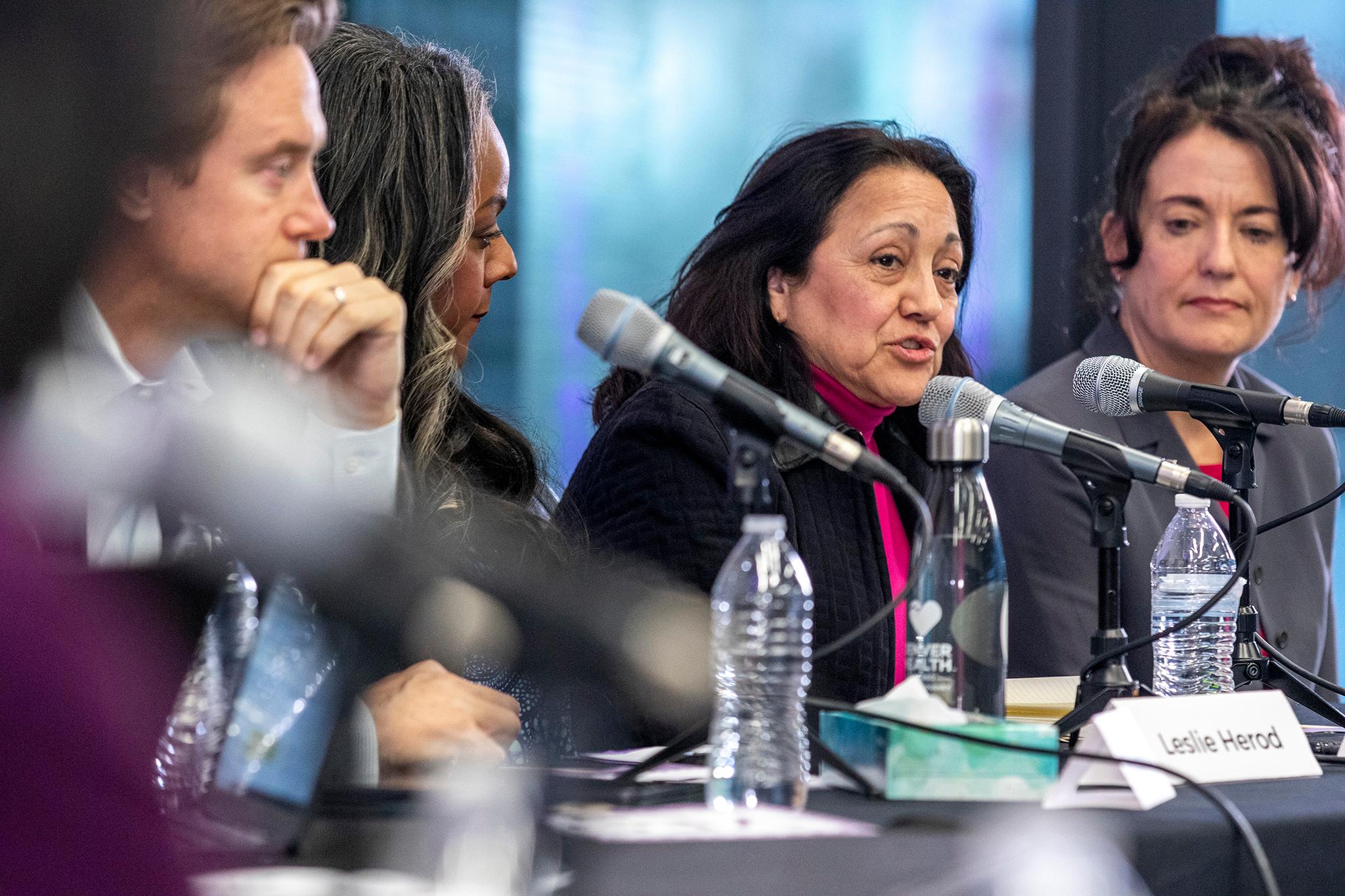
Council has relatively little say over the outcome of the budget and pulling off amendments is tough. For example, in passing Mayor Michael Hancock's $1.6 billion budget, City Council only managed to make $1.1 million in changes. Councilmember Amanda Sawyer led that charge.
Ortega also cited experience as the board chair of Del Norte Neighborhood Development Corporation, a housing nonprofit in the Highland neighborhood. The group has a $3 million to $7 million annual budget, according to recent tax documents.
"I ended up having to take control of our organization when our director was no longer there," Ortega said." "So it was overseeing the whole administrative operations that included working with a property management company and the staff of that organization, while at the same time running my own staff within the city."
We asked for clarification after the debate to better understand how long she served in that role.
"During the pandemic, Del Norte's Staff Director retired and it quickly became evident that their replacement was not a good fit for the organization," Ortega wrote in an email. "I stepped into the role which included managing our bank accounts, property management companies, construction projects, and more. I maintained my title as Board President but acted in the role of Staff Director from April to October 2021, overseeing an executive leadership team of consultants, and managing day-to-day operations until the new Staff Director was hired."
Though she didn't mention it in the debate, she also served as the first executive director of the Denver Commission on Homelessness.
Herod cited two big qualifying experiences: serving on the Joint Budget Task Force and the Appropriations Committee, where she said she "managed" the state's $40 billion budget.
While both committees are involved in passing the budget, they are legislative committees.
She also said, "I created the largest mental health foundation in the State of Colorado, Caring for Denver."
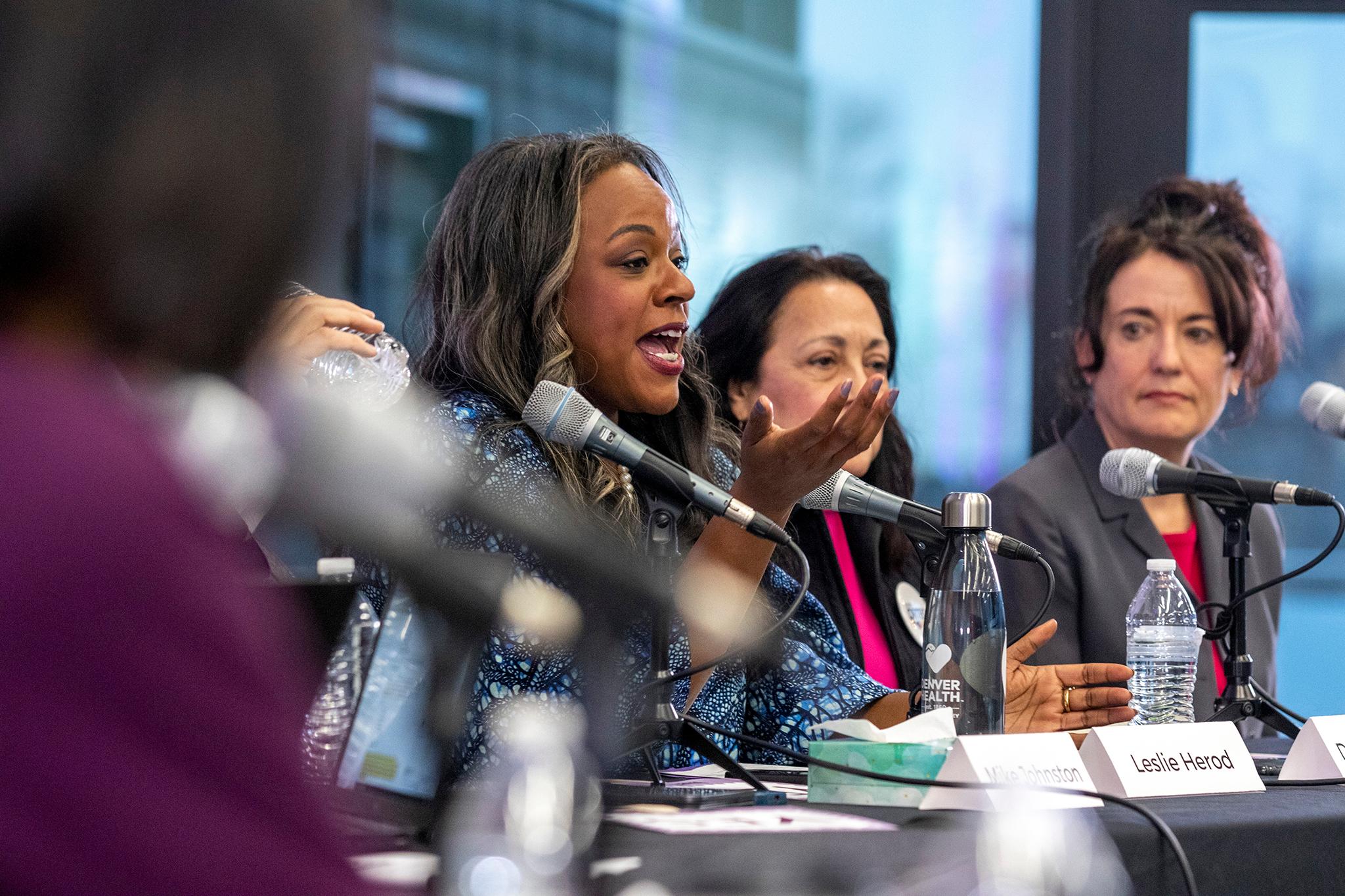
Caring for Denver was created through a ballot initiative voters passed approving a 25-cent per $100 sales tax for mental health and substance use treatment. Herod led the campaign with support from the Mental Health Center of Denver and Mental Health Colorado.
Herod also chairs the board of the organization.
"We've given out almost $200 million to over 200 grantees in the City and County of Denver," Herod said at the debate. "I created that from scratch. And now we're operating for the people. That's how I'll lead as Mayor."
Herod has also been the boss of her legislative staff, who have reported some rough experiences that Denverite covered in depth.
Rougeot, the sole Republican in the race, declared he was different from the other people on the stage because "I'm not a politician" -- though, to be clear, he is now running for elected office.
"I am a former Army officer," he said. "I deployed to Afghanistan with the Rangers. We were protecting Kabal from large suicide bomb attacks."
He was an Army intelligence officer, not a Ranger himself.
He also said he grew a business from 12 to 40 employees, paid them good wages, and offered good benefits.
"I know what it's like to actually have to make payroll every two weeks," he said.
Brough served as CEO of the Denver Metro Chamber of Commerce for more than a decade.
She managed the organization's budget and operations, which included working with 3,000 members and overseeing a staff of more than 60 people.
She also headed human resources for the City of Denver and negotiated contracts with workers. She served as then-Mayor John Hickenlooper's Chief of Staff.
"The general fund then, which is the budget you're referring to of about a billion and a half today, was $850 million with about 10,000 employees," she said. "And that was the largest responsibility I've had."
Gardner, who works at Salud Family Health, has served on various boards and in both the nonprofit and for-profit sectors.
While tax filings for Salud Family Health show the organization has more than an $80 million dollar budget, he was a vice president of information technology, hardly the head of the whole operation. But in that work, he did get to practice penny-pinching.
"We have the nonprofit side, which I've been an executive there, and it's quite difficult because you have to look at restricted budgets," Gardner said. "So that means you have to be even much more careful about where you spend money and how you spend money.
"On the corporate side, we have larger budgets," he added. "But there again, we're always trying to look around the corner which makes you that much more dialed-in to where you want to go. In addition to that, the most important thing about a budget -- I don't care if it's one dollar or one billion -- is prioritization, and that's what I've had to do."
In terms of managing people, he didn't say much.
Johnston claimed being a CEO "in different capacities" for the past 20 years.
He was a school principal, with two years as the head of the Joan Farley Academy and less than four-and-a-half years as the principal and founder of Mapleton Public Schools.
He spent another nine months as the head of the nonprofit New Leaders New Schools.
He also founded the national Urban Leaders Fellowship, an organization that had between a $20,000 and $35,000 budget in tax filings for the two years we could find them.
Most recently, he spent three years as the head of the foundation Gary Community Ventures.
"I think probably the way people would most have seen my leadership is if during the pandemic," he said. "If you ever got a COVID test or COVID vaccine, I built the organization called COVIDCheck which provided COVID testing around the state.
"I grew it from one person to 1,500 employees," he continued. "We did more than 15,000 tests a day, helped vaccinate and test more than a million Coloradans, which meant people did get regular, easy access to testing vaccines to keep them safe."
Roberts said he founded a nonprofit in the basement of his home. The group has raised more than $2 million dollars for community development projects.
He talked about funding redevelopment in the Holly after part of the block was burned down.
"I've spearheaded movements where we've gotten justice for victims of police abuse," he said. "I helped draft Senate Bill 217."
Senate Bill 217 was a piece of legislation he worked on with Herod that beefed up Colorado's body-camera laws.
"We've done a lot of work," he added. "Not just myself but my team that supported me."
Hansen, a state senator, said he was the only candidate on stage who had been responsible to both voters and shareholders.
Like Herod, he sat on the Joint Budget Committee, noting he did so during the pandemic.
"In my 10 years in the private sector, I worked for a $15 billion dollar global company called IHS which headquartered here in Denver," he said. "I had an incredible experience there, working on billion-dollar projects running large teams all over the world, from Dubai to India to exotic Michigan."
In the job, he served as the director of energy insight, the director of product management and the director of corporate strategy -- not CEO.
Wolf described his experience as an investment banker.
"My work is in the global capital markets where there's a really large magnitude of numbers," he said. "Any typical transaction, I'm in the middle, so there's a buyer and a seller and you have to make both sides work."
His "first job" as mayor would be to "be a fiduciary."
Mayors should be well-rounded, Calderón said. For her, that means having four degrees, including a master's degree and a doctorate in education.
"I've been a nonprofit executive, including running a legal clinic for abused women as well as shelter programs and administrative programs, hired staff, made payroll," she said.
Calderon also founded the city's reentry program for people coming out of incarceration.
And she's currently the head of Emerge Colorado, an organization with three total staffers -- including Calderón -- that trains Democratic women on running for office.
Rodriguez described his experience in the private, public and nonprofit sectors.
He claimed being one of the first people of color to provide investment banking services in his field. He did that work at the George K. Baum & Company, where he was a senior vice president and also at D.A. Davidson & Co., where he was a managing director of public finance
He described fighting for many years to build a business from the ground up and overseeing financial statements for more than 23 years.
He's served on the boards of "nearly eight organizations," he said. "These are some of the most efficient and important civic and nonprofit organizations in our community."
Takeaway 2: Rodriguez had a rough night.
His competitors criticized his plan to involuntarily detain people having mental health and addiction crises as a homelessness solution.
"You said that you would forcibly institutionalize most of Denver's homeless population, as many as 1,000 people, and hold them against their will for months of treatment in what you're calling a field hospital," said Roy. "Civil rights attorney Joe Salazar called that an internment camp, and said it's illegal. RTD's director called you a fascist. Why do you believe your plan is legal?"
To clarify: The RTD director Roy referred to was elected board member JoyAnn Ruscha, who won her seat as a write-in candidate. She wrote on Twitter: "Trinidad Rodriguez is a fascist who wants to round up poor and disabled Denverites and place them in prison camps. Sadly, he's not the only one."
To explain why he believed involuntary detention was a legal strategy, Rodriguez cited Title 27 of the Colorado Revised Statutes. That section includes rules about when a person can be involuntarily detained: basically, if they're a threat to themselves or others. Being without shelter is not a cited reason involuntary detention would be allowed.
"This is not a pie-in-the-sky fantasy," Rodriguez said, objecting to being characterized as a fascist and an architect of internment camps.
"This is not an internment camp," he said. "This is a place where we can provide the standard of care for healing for people who are suffering and dying on our streets today. And it is the right thing to do. It is the only right thing to do."
That answer did not satisfy his fellow candidates.
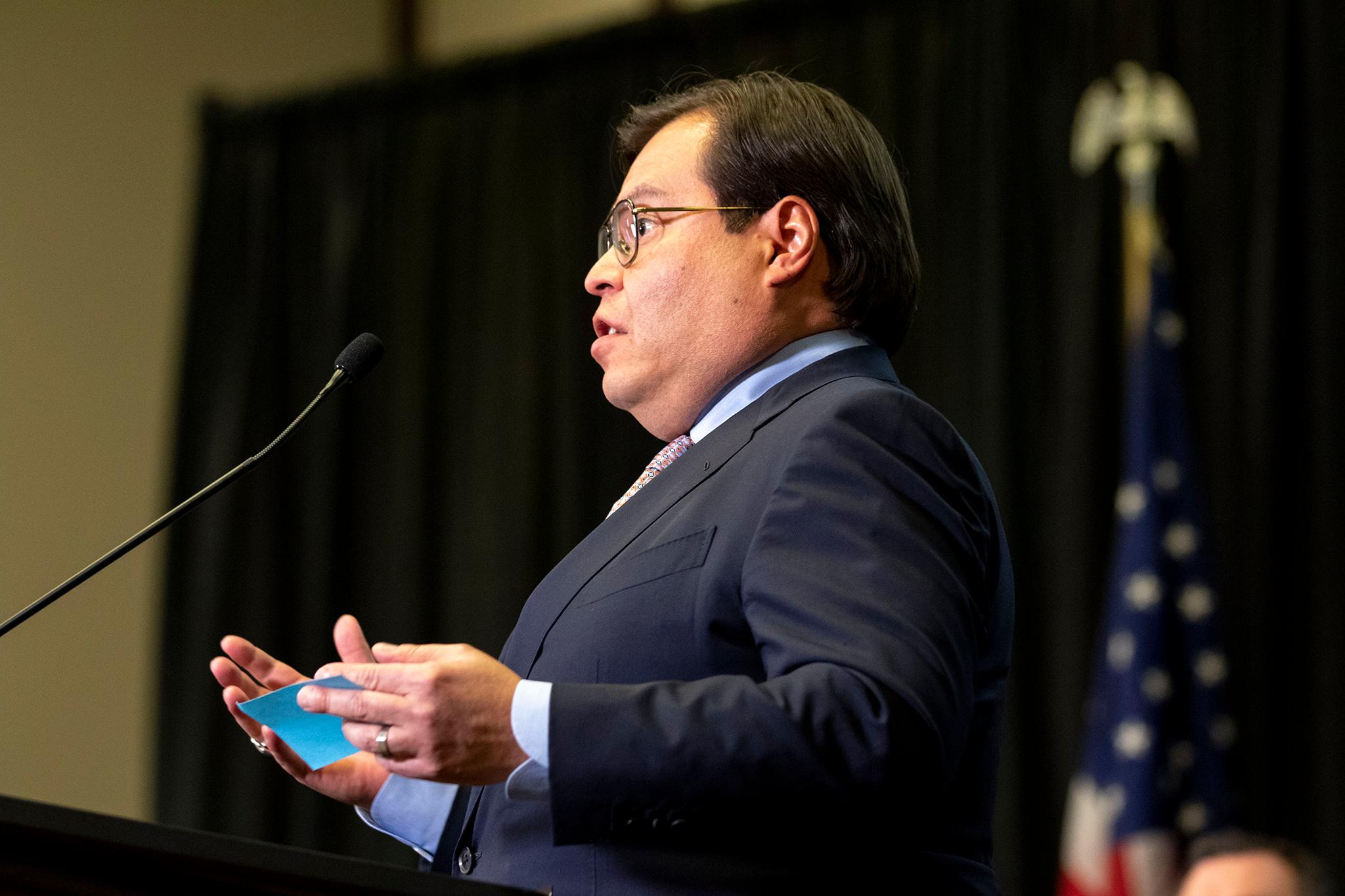
"This is why people with a little bit of knowledge can be dangerous," Calderón said. "There's a reason why we have a separation of branches: the judiciary, the executive and the legislative. Judges determine involuntary commitment, not the executive. There's a process for taking away people's constitutional rights and human rights."
She went on to say: "A mayor is not an emperor."
Gardner took a shot at Rodriguez, saying, "We talked about internment. The country has tried that before, and it didn't work out well."
He also referred to the plan as "paternalistic."
When 9News host Kyle Clark referred to how the plan was compared to internment camps, Rodriguez took umbrage.
"A. That's not my plan," he said. "B. I take severe offense to the idea that people who are experiencing actual health crises and are a danger to themselves or others are like Japanese people," and he demanded an apology nobody gave.
Takeaway 3: Rougeot, who has been omitted from other debates, received a brutal question from Clark.
"You've made a series of false claims in this race," Clark said. "I mean, obviously false stuff, like saying you're the only candidate with business experience, which is not true; saying you're the only candidate talking about enforcing the urban camping ban, which is not true; saying that you're the only candidate not taking Fair Elections Fund money, which is not true; and false allegations about some of the other people sitting up here on stage tonight, like your claim that other candidates were illegally paying themselves salaries from Fair Elections funds, which is not true.
"What does your willingness to say false things tell voters about your leadership?" he added.
Rougeot claimed Clark's claim was false, and doubled down what Clark described as "false stuff."
Takeaway 4: Herod sort of clarified her position on rent control.
Most candidates on the stage have said they oppose rent control in Denver, noted Clark: Brough, Johnston, Rougeot, Rodriguez, Wolf, Hansen and Ortega.
Calderón, Gardner and Roberts support some for of rent control.
Herod, on the other hand, had repeatedly refused to answer questions about the subject -- even in a questionnaire, according to Clark. At the debate, he got his answer -- sort of, kind of.
The candidate explained that she had not answered about rent control in the questionnaire because she was waiting to vote on it at the Statehouse. She ended up voting yes to giving municipalities more control.
"Look, we need 50,000 more units of real truly affordable housing today," Herod said. "That's below market rate. For people who are living in the city today. We've got to make sure that if you're a mom trying to make ends meet that you don't get a notice that your rent is going up by $300 or $400 the next month."
She did not commit to pushing for rent control in the city, but she did say it should be "on the table."
Instead, she emphasized her plan involved building hundreds of income-restricted units on vacant lots.
Takeaway 5: Some candidates reported having really bad experiences taking their kids outside in Denver.
"We have to confront the homelessness crisis," Hansen said. "We have to address public safety. And we have to make Denver more affordable as we build the greenest city in the entire country."
He told a story about his kids seeing scary things on the Colfax Avenue bus.
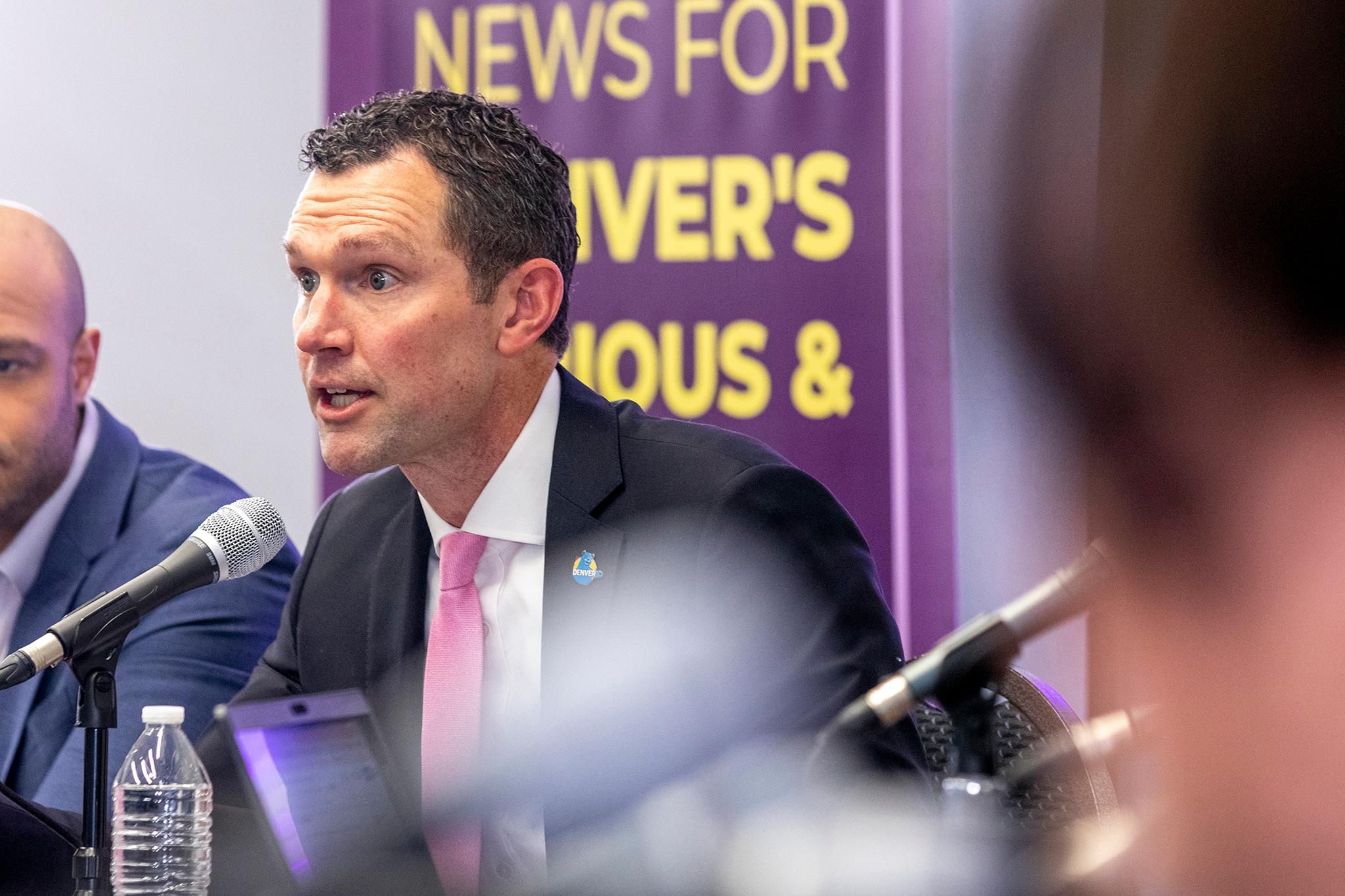
"You know, a couple of months ago, I took my boys downtown," he said. "We jumped on the 15 bus, and I immediately started getting questions: 'Dad, was that a drug deal I just saw?' 'Dad, why are we feeling so unsafe Downtown?'
"As a father, that's a heartbreaking conversation to have," he said. "Denver, I know we can do better. I'm ready to write this next chapter with you."
When asked about his solution to homelessness beyond enforcing the camping ban, Rougeot said his campaign was looking at root causes. Then he told a story about watching a man poop.
"I have a beautiful park right by my house, and I've gone out there with my now-three-year-old in my arms, walked out the back gate and seen a man with his pants around his ankles using the restroom, defecating along the fence line," he said.
"That man is someone's son," Rougeot said. "That man might be somebody's father. And that man is dealing with a fentanyl addiction issue or other drug addiction issues. So the actual compassionate thing to do for that person is to get them clean. The compassionate thing to do for that person is reconnect them to family. The capacity to do with that person is allow them to get back to the point where they can hold a job. They can reconnect with family."
The camping ban is the first step in getting that person treated.
We asked how he knew the man was a drug addict. Here's how he responded:
"We could see him using drugs and drug paraphernalia on the park bench, along with his defecating in front of a child at a public park highlight this man's issue with drug addiction," Rougeot wrote.
Takeaway 6: Does Brough think ending homelessness in four years is possible? "I don't think so," she said.
"I think part of this is telling the truth," Brough added, taking a jab at Johnston's campaign, which has made that promise.
"What we really have to do is build a safety net that catches people when things go wrong," she said. "And if we build that safety net right, I think we can get people the support and services they desperately need. But I think we have to do that differently."
When Clark asked her what Johnston's plan got wrong, Brough was stumped.
"Oh, is my time up," she joked before criticizing his emphasis on tiny homes and arguing people need mental health and other supportive services -- all of which are included in Johnston's plans.
Takeaway 7: Most of the candidates took swipes at Johnston.
Johnston's an obvious target, since he recently received the Denver Post's coveted endorsement and has the largest amount of money donated to his campaign from independent expenditure committees. He's in second place when it comes to total money raised behind Brough.
Roberts, who once shared an office with Johnston in the Holly in Northeast Park Hill and recently recalled to Denverite how the state senator would bring ivy league students to the neighborhood who would leave trash all over the facility, jokingly described Johnston as "punchable."
Roberts said that after he left their office, Johnston replaced him with active Crenshaw Mafia Bloods and asked whether the state senator was partially responsible for the rise in homicides in Denver. Johnston dodged the question, celebrating the work the two did together.
Roberts also chided Johnston for trying to solve homelessness with Tuff Sheds, a knockdown of Johnston's plan to build tiny home villages for unhoused people. Roberts prefers public housing and public banking as a solution.
"I agree with Terrance," Calderón said. "They want housekeys."
She went on to say she created her homelessness plan with unhoused people, and they told her they don't want temporary housing long- or short-term. She said Johnston's plan does not offer permanent housing and is thousands of units short of what's needed. A master-leasing plan would work better, she argued.
Johnston said he has a plan to build 25,000 homes. In the meantime, a short-term fix is necessary.

"What we know is right now people need access to safe, stable, protected housing, and that does mean not living in a tent, not living in encampments, and you need something we can build quickly."
Wolf asked Johnston why his independent expenditure committee is accepting money from "coastal billionaires" and why those people should have sway in the election.
"I don't have people funding that entity that have interests before the city," Johnston said. "I'm not looking at people who have complicit or vested interests there. I obviously have nothing to do with that entity. At least I don't raise for it. I don't know who gives to it."
Yet he easily could. Donors are listed in public records. And he does claim to know their intentions. Those people, he said, do have a vision for how they want cities to function.
"I've been working hard to build resources from my own campaign directly that have come from people all across the city," Johnston said. "And we're proud of that support."
Takeaway 8: Not all candidates had a chance to debate.
Some candidates didn't rank high enough in the 9News/Denver Gazette poll to be on the stage. Those include Ean Thomas Tafoya, Kwame Spearman, Aurelio Martinez, James Walsh, Robert Treta, Renate Behrens and several write-in candidates: Jesse Parris, Paul Fiorino, Abass Yaya Bamba and Matt Brady.
Some of those candidates were frustrated with being omitted from the debate.
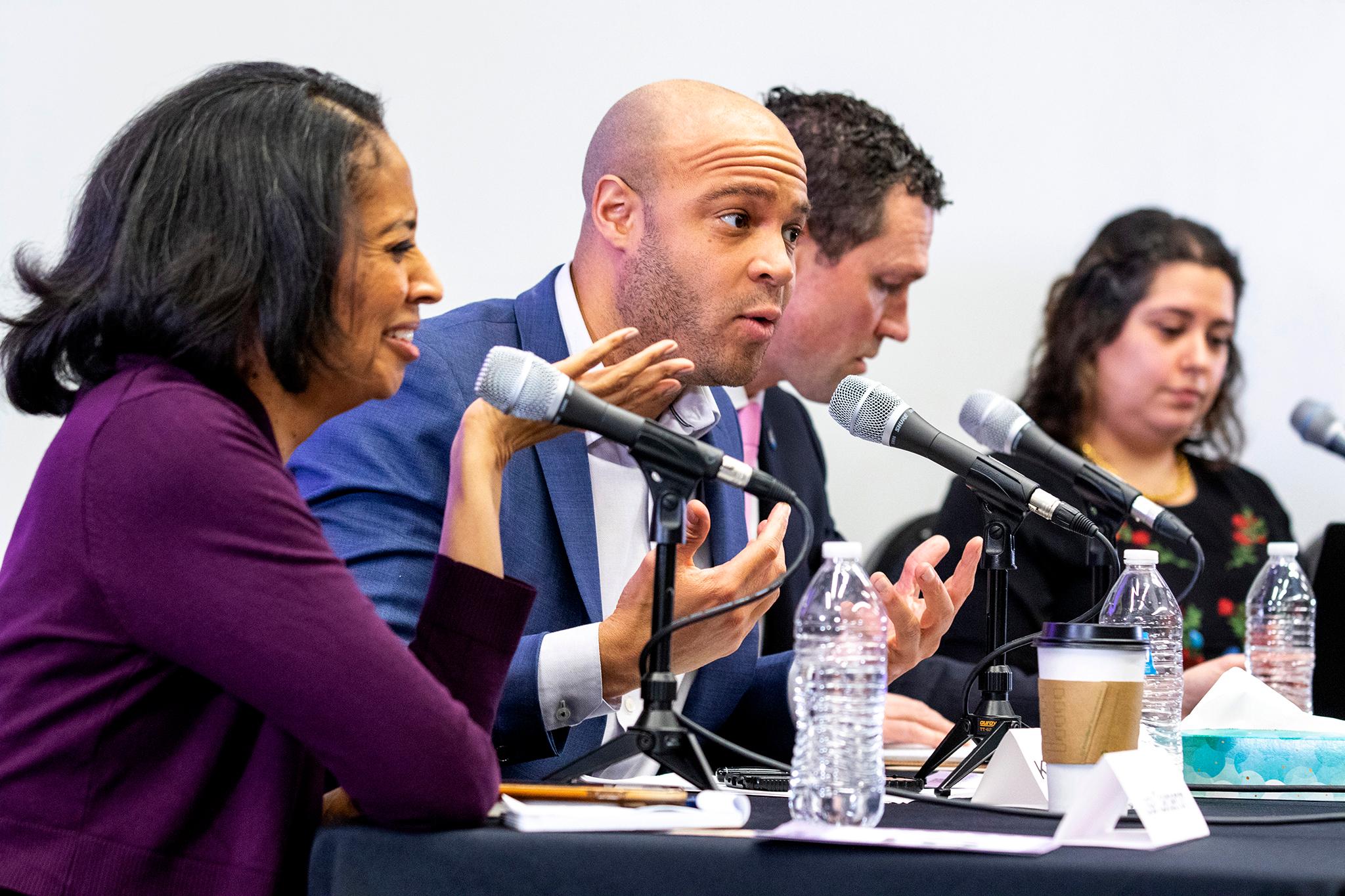
"Denver is at a crossroads, which is why city voters have so many choices this year and why the media is struggling to fairly cover all the candidates," Spearman said in a press release about being excluded from the debate. "9News' decision to err on the side of being exclusionary does a disservice to Denver neighborhood voters and plays favoritism to those who have been in the race the longest."
Yet many of the most substantive debates have excluded candidates based on various criteria -- including Denverite's own People's Forum, in which eight candidates were selected to participate for having the most Fair Election Fund contributions and seven candidates did.
Spearman participated in Denverite's debate without complaint. He noted several times throughout the election cycle that having 17 people debating on stage is simply too many.
Here's what's next.
Denver voters have until 7 p.m. on April 4 to vote. Ballots were sent out earlier this week.
For more information on this election, check out the Denverite voter guide.











